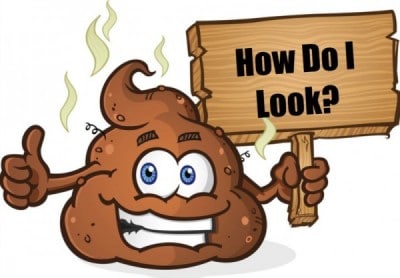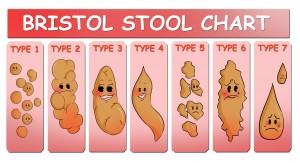What does your poop look like?
You may find it hard to believe, but a lot can be said about normal processes that occur within our body just by analysing our poop. Changes in the colour, consistency, texture and even smell can indicate an abnormality within the bowel or digestive system. Even the Oprah Show and Doctor Oz have dedicated an episode of their shows to this topic.
In this article, I’d like to explore how our poop can change, if we suffer of irritable bowel syndrome.
What is healthy poop?
Surprised by the term ‘healthy poop’? Well, don’t be. The food that we consume is broken down into its natural components by enzymes that are present within our digestive system. During this process, nutrients absorbed through the bowel loops and any remnants such as fibre and waste material is passed out of the body as poop. The colour and smell of poop is imparted by compounds such as stercobilinogen. Typically, the poop is a varying shade of brown from light to medium brown, and any alterations in this such as black stool or green stool can in fact indicate a pathological process occurring within the body. For example, the passing of jet black stools that is very foul smelling can indicate the possibility of bleeding within the stomach.
A healthy poop should be shaped like an S and have a uniform and smooth texture, not too hard nor too soft, formed into one long shape and not breaking off into small fluffy pieces.
Irritable bowel syndrome and the poop problem
People like me that suffer from irritable bowel syndrome, also called IBS, understand what I am talking about because this is a condition where the bowels tend not to work properly. Instead of the individual passing normally formed stools, we suffer from diarrhoea or constipation (or sometimes both).
Diarrhoea is when the poop is looser and more watery. The exact cause is not known, some research says that symptoms can be triggered by emotional stress, hormonal changes and food allergies. Certain studies have also shown an increase in the electrical activity within the muscles of the colon in patients with diarrhoea predominant IBS. Some individuals who have IBS may also pass excessive flatulence and have mucous in their poop. Mucous may be seen due to inflammation and incomplete absorption of water from the bowel loops.
Constipation is when IBS sufferers have difficulty opening their bowels and passing stools regularly and when they do, it’s harder and lumpy. As explained before the cause is not clear but some scientific studies have shown that motor impulses that are transmitted along the colon occur at short intervals which in turn slow down bowel movements.
Irritable bowel syndrome can also present as a combination of both diarrhoea and constipation as well and this occurs primarily due to a combination of the above mechanisms. Inflammation of the bowel loops also plays an important role and is a contributing factor in the pathogenesis. Bacterial overgrowth has also been implicated.
Our poop indicates our health and the frequency with which we open our bowels can indicate the presence of irritable bowel syndrome. Making a note of our personal habits can help manage the condition easily and effectively. Clearly, our poop is not just the digested food but a lot more!
I hope you have enjoyed this post away from your meals 😉
xo
Larah




hahaha.. informative and entertaining piece on poop, always thought poop was just digested food, well i see its a lot more. thanks for stating that out
Thanks for your comment Jennifer. There is always something to learn I guess, even from our poop 😉
haha wow, I never thought I would read an article on poop but this is actually interesting to know what actually happens. I also love the pics!
Thank you for your comment Vanessaaah, this seems to be one of my most read articles. It is funny like a very disgusting topic can attract attention! :O=
So now I know that how a health poop looks like! Just joking. But your article torches more light on how to know whether our stomach is on the right track or not.
Recently, I had issues with my digestive system. I had to visit toilet more than six times a day. And poop was small fluffy pieces as you said. I was advised to stop eating oily food and eat more of carbohydrates containing vegetables which I started and since then has been feeling way better.
LOL Julia, I am glad you feel better though. I will soon post some vegetarian low FODMAPs recipes that you may be able to enjoy. Take care.
the pics are real cute larah. That was rightly said about poop. As stated above, IBS by definition involves a change in stool appearance. So, yes, your stool may look abnormal to you. Just remember that abnormal does not necessarily mean that your doctors have missed a more serious disease. Typical IBS stools can be:
Filled with mucus
Thin and pencil-like
Hard, lumpy and difficult to pass
Soft, loose and watery
This advice to not check the appearance of stools too often is especially relevant for IBS sufferers. The psychology of IBS can be similar to that of post-traumatic stress disorder. When you have been traumatized by severe symptoms, your brain automatically wants to search for signs related to your disorder. This can result in hypervigilance — a constant state of anxious watching and worrying.
Thank you for your input Dr Jayan. I guess that there should be moderation in all things, even checking our stool 😉
P.S love the cute pictures too haha
Hahaha Larah, I thoroughly enjoyed your article. Very entertaining, funny and educational at the same time. I’m very pleased to say that my poop poop is healthy poop poop based on your information lol
Thanks for the comment Holly. I am pleased your poop is as it should 😉